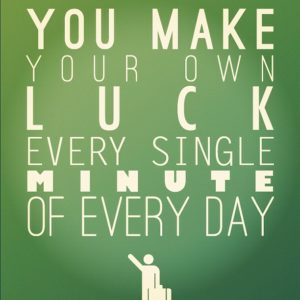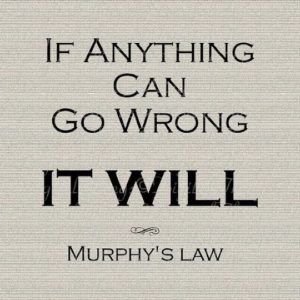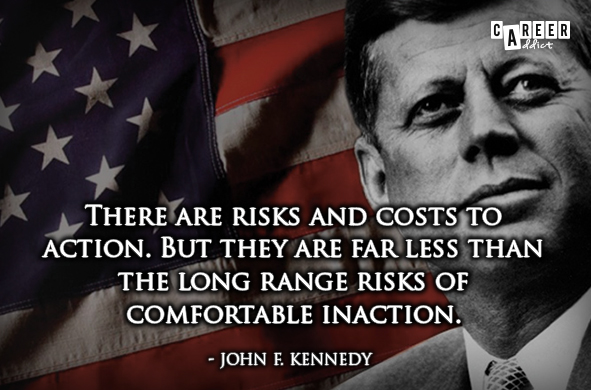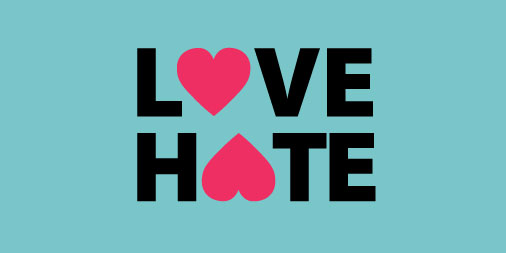 What is the nature of luck in my life? Do I consider myself a “lucky” individual? Unlucky? How do we measure “luck”?
What is the nature of luck in my life? Do I consider myself a “lucky” individual? Unlucky? How do we measure “luck”?
Let’s look at the big HUGE picture. If, as science proposes, everything started at The Big Bang almost 14 billion years ago, and our solar system (as a result of that incident) was created some 4.5 billion years ago, and the first life forms showed up on Earth about 3.8 billion years ago, and our species, Homo sapien, appeared only about 180,000 years ago, and you are reading this so you’re somewhere in your average 78-year and 9-month life span, and you don’t know how you got here, well then you’re lucky!
Now let’s narrow that down to just the human history: Homo sapien had to hunt and kill his food as well as protect the food sources from others. Homo sapien dealt with disease, or didn’t. Homo sapien endured and survived the last Ice Age (which only ended about 10,000 years ago).
So if your ancestors learned to hunt and kill their own food, protect that source from others with the same intent, develop immune systems to fend off viruses and diseases, stayed south of the advancing ice sheets of one of the last three ice ages, and you’re reading this, you’re lucky!
Add to that where we live and the time in which we’ve been blessed to populate and you’re probably in the top 1% of health and prosperity on the planet. So things are already going pretty well.
The average life span in the U.S. is about 78.75 years. How has your life gone so far? Would you describe it as lucky or unlucky? Or average?
What does your fortune model tell you? When I fail a putt on the 18th green and utter, “I knew that was gonna happen,” it sounds like my fortune model is prepared and even focused on being unlucky.
What I expect is frequently what happens. I can—and do—create my own reality! So if my fortune model is comfortable predicting negative outcomes, then I’m right (about the prediction) when I fail (at the task I predicted I’d fail). And being RIGHT makes me feel good. Get it? I actually reward myself for being correct that I would fail (again) and so I’m contributing to my misfortune.
But what if I instead accept failure as a statistical fact—part of life as I know it—and flip that reality model I create for myself. Have you ever experienced an incredible incident of luck? That parking space in the massively crowded parking lot, a call with great beneficial news, catching a well-hit ball in the outfield after running flat out with your arm outstretched only to hear your self-talk say, “I KNEW that was gonna happen. And you were right then, too.
So there’s at least anecdotal evidence that our brains play a big part in how we see our fortune model. It probably even carves it up into realms: “lucky in love,” “unlucky at gambling.”
I am (and believe it wholeheartedly) extremely lucky at finding that parking space, right up front where and when it is beneficial to me. It’s a running joke in my family how statistically whacky this occurrence is. I just drive directly to the closest section at the movie theater and wham! There it is. Happens over and over again. I recognize it. I nurture it. I believe it. And it happens.
OK, Kim. But that’s a pretty silly and not extremely useful example, you may say. Agreed. But it is an example, and my brain has taken the time to notice it and use the feelings associated with it to work on other areas. Like client relationships, rally stages, and adventures (travel to places I’ve never seen, which frequently become my latest “favorite place on Earth”).
For me it boils down to the power of wanting to be “right.” If I “know” that something unlucky is going to happen, and it does, then I’m right… and there’s a certain comfortable feeling about that. On the flip side, if I choose to “know” that this is gonna work out and probably better than I could ever imagine, and it does, there’s a certain comfortable feeling about that, too.
OK, but what if I’m wrong, and it doesn’t work out? Or the terrible unlucky thing doesn’t happen? So in either case, I’m not right. How much attention do we pay to that? My experience is that we pay nowhere near as much attention as when we are right. When we are right—about winning or losing—is much more powerful and behavior-stabilizing than when we’re not.
This is a case of optimism.
If I always think the best will happen and it does, I’m right and it supports and reinforces a positive fortune model. If it doesn’t (and I’m not right), I pretty much ignore it.
If I always think this golf shot is gonna suck and it does, I’m right and that supports and reinforces a negative fortune model. If it doesn’t (and I’m not right), I pretty much ignore it.
So what the cost of assuming everything will go as I want it to? Considering myself lucky? If it works, I’m right. If it doesn’t, I’ll probably pay little attention to it anyway.
That talk in our head manages our fortune model. What are you hearing?




As usual, another in-depth plunge into the jungle that is our mind… always with valuable insight and a focus on positive outcomes. I am so blessed (lucky) that out paths crossed via Dr Tom Hill so many years ago.
Keep up the good work; my mind craves it while my body and spirit rejoices.